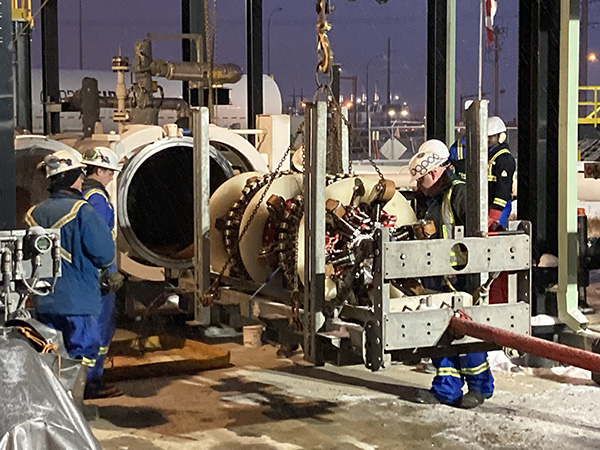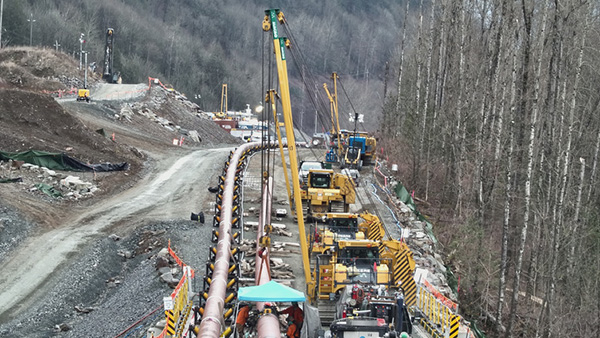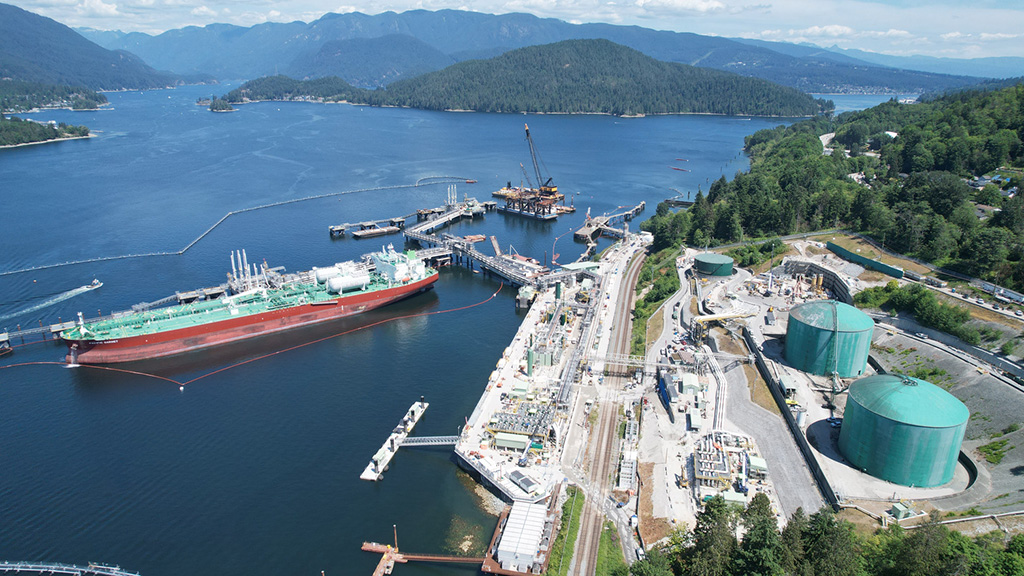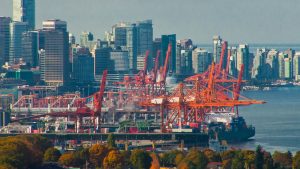Four-and-a-half years after construction began, one of Canada’s most controversial projects, the Trans Mountain pipeline expansion through Alberta and British Columbia, will enter commercial service May 1.
In an update on its website posted April 2, the Crown corporation noted one remaining hurdle, completion of a pipe pullback for the Mountain 3 horizontal directional drill in the Fraser Valley in B.C., had been achieved, and stated, “The commencement date for commercial operation of the expanded system will be May 1, 2024. Trans Mountain anticipates providing service for all contracted volumes in the month of May.”
Industry observers expressed surprise. Ontario-based oil market researcher Rory Johnston, founder of commoditycontext.com, posted on X, “Pretty well everyone with whom I’ve spoken regarding TMX start-up was anticipating June 1. The ultimate irony that TMX’s last surprise will be to beat its final expected deadline.”
Trans Mountain CFO Mark Maki commented, “What a long, strange trip it’s been…Even though this has taken longer than expected, Canadian crude producers, crude oil consumers and transporters are eagerly awaiting the expansion project’s in-service, and all expect it to have a significant impact on the global crude trade.
“We’re happy. We’re getting to the end and that’s a reason to be proud and we’re doing something good for the country.”
Ignoring the political turmoil, environmental protests, pipeline blockades, rallies, legal challenges and Indigenous resistance associated with the $30-billion-plus project, for some 35,000 construction workers, engineers, supervisors and others, the job represented more than just a construction project — it was a project on a massive scale, across difficult terrain, with challenging technical requirements and undertaken in the face of natural threats such as floods and wildfires.
Trans Mountain highlighted the achievement in response to questions submitted by the Daily Commercial News.
What is the project?
The project consists of twinning an existing oil pipeline. Crews are installing 980 kilometres of 36-inch and 42-inch diameter pipe, reactivating 193 kilometres of pipe, and constructing 12 new pump stations, 19 new storage tanks at existing terminals in Burnaby, Sumas and Edmonton, and three new berths at Westridge Marine Terminal in Burnaby, B.C.
Once completed, the capacity of the pipeline system will increase by 590,000 barrels per day to a total of 890,000 barrels per day. Canadian oil will be able to reach new markets at world prices instead of the discounted prices it currently receives from U.S. buyers.
The project also included a 2.6-kilometre tunnel four metres in diameter between the Burnaby Terminal and Westridge Marine Terminal which holds the Westridge Delivery pipelines.
Who is the owner?
The Canadian government purchased the Trans Mountain project from Kinder Morgan Canada in 2018 for $4.5 billion. Construction began in December 2019. Cost estimates have increased steadily and one year ago Trans Mountain pegged the price at $30.9 billion.
Cost overruns resulted from inflation and supply chain pressures; construction solutions for the Burnaby Mountain Tunnel; higher costs for major infrastructure in densely populated areas from Sumas to Burnaby; archeological preservation requirements; flooding remediation; and water disposal costs associated with the high-water table in the Sumas Prairie, among other problems.
Trans Mountain says the project remains commercially viable and Canada’s overall investment in the project remains on course to generate a commercial return. In 2022, the government stated no additional public money will be spent on the project with all subsequent financing to be derived from private sector lenders.

What was the major technical challenge of the past year?
Between Jan. 25 and 27, 2024 during pipeline pullback activity for the Mountain 3 horizontal directional drill between Hope and Chilliwack, B.C., Trans Mountain encountered unexplained technical issues. Pullback is the step where pipe is pulled into its final position. The problem was resolved as of March 29, enabling Trans Mountain to confirm a May 1 operations startup.
What is the Westridge Marine Terminal rock reef complex?
The rock reef complex at Burnaby is an important marine rehabilitation project. It’s made up of 10 reefs covering more than 10,400 square metres — about the area of a city block. It consists of three layers, including a bedding layer, a rock mattress layer and then, depending on the reef type, various sizes of quarry rock and riprap to protect the foreshore from erosion.
The rock mattresses were created specifically to ensure the stability of the rock reef complex.
First, clam-shell buckets and bomb-bay boxes positioned the rocks in a high-strength geotextile. Derrick barges fitted with a specialized lifting device then placed the mattresses onto the seafloor. Other equipment, including aggregate supply barges and an unloading conveyor, added more rock layers.
Installed a year ago, Trans Mountain said the environment is showing promising signs of inhabitation.
Trans Mountain’s teams conducted more than 18,700 person days of environmental inspection.

Who got the work?
Among firms awarded construction contracts on the project were Surerus Murphy Joint Venture, a Ledcor and SICIM Limited Partnership, Michels Canada, Midwest Pipelines, Cord, Epcor, Banister, Kiewit Bonatti Trans Mountain Partnership, SA Energy and a Macro Spiecapag JV.
Michels Canada worked with unionized operating engineers, labourers, plumbers, pipefitters and teamsters.
To date, Trans Mountain and its contractors have hired 35,330 workers, of whom 3,600 are Indigenous people. As of Feb. 29, there were 8,600 people working on the project.
Trans Mountain has generated $4.8 billion in contracts with Indigenous businesses, which is 25 per cent of total contracts awarded to date.
Labour costs escalated due to workforce shortages and an increase in “green-hand” labourers.
What’s left?
To complete the project, Trans Mountain must obtain outstanding approvals from the Canada Energy Regulator. After operations begin, Trans Mountain will continue cleanup, reclamation and road and civil work.
Follow the author on X/Twitter @DonWall_DCN.










Recent Comments